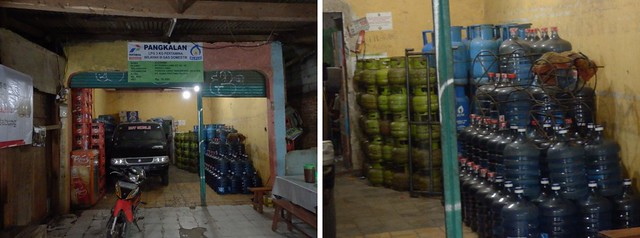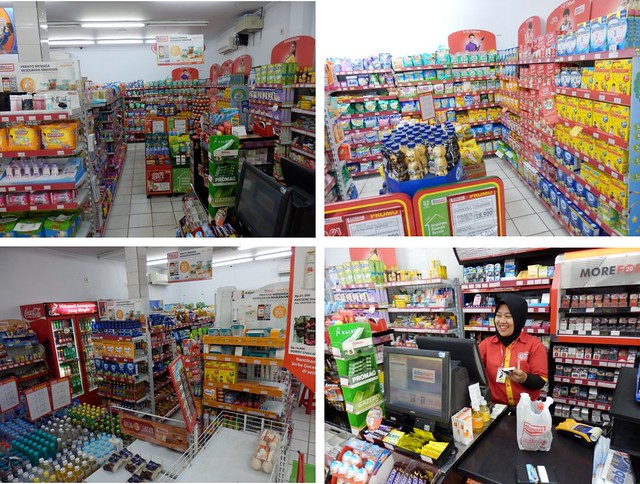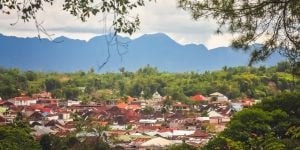The Indonesia expat reference thread
Owning land in Indonesia.
Freehold for foreigners is impossible in Indonesia, but a foreigner married to an Indonesian may own a property in their Indonesian spouse's name if they have a prenup stating any property is owned solely by the Indonesian half of the relationship.
Apart from some types of companies, it's illegal for a foreigner to own land in Indonesia.
This goes back to the colonial era, the independence struggle and the political landscape when the Dutch were finally removed.
There are a couple of legal ways you can own land, or at least your Indonesian wife or husband can if have a prenup agreement.
“Indonesian Nominee Owners”
This is a really bad idea that can leave you in a massive mess.
It goes like this - You supply the cash for an Indonesian Nominee Owner to buy the land in their name, all done with the help of a solicitor who makes a nice contract for you.
One slight loophole, a bent solicitor or a bent nominee who simply sells the place out from under you, and you're basically buggered because you can't go to court and complain you were ripped off as part of an illegal deal.
Long term lease agreements are fine.
These agreements are perfectly legal, but you never own the land, only have use of it.
Apartments/flats with no land are legal to buy with some restrictions, mainly that they are very expensive.
UPDATE for UU13/2016[/b]
Most foreigners still can't own land in Indonesia, but there are now some exceptions for flats/apartments.
The new law has opened the market to some better off buyers in a limited way.
There is a minimum value set on the property and other restrictions regarding what property you can buy and who you can buy from.
You must hold residency status and, if that is lost, you must sell within one year.
Upon death, a property can be left as inheritance, but only to someone with residency rights or it must be sold. There is also an 80 year limit on ownership, making it a lot more like a long term lease.
You should also note, if the sales rules aren't followed, the government can auction off the property and the buyer has no control over the sale, potentially meaning a large loss.
Defamation
Indonesia has seriously harsh laws regarding defamation, and harsh punishments to go with them.
The 2008 Electronic Information and Transactions (ITE) Law and articles 310 and 311 of the Criminal Code (KUHP) can be used, and leave the accused with a massive fine, or even prison time.
The upshot is, even if you think your boss's behaviour probably means his parents aren't married, don't say it in public.
More seriously, don't make claims about anyone or anything in Indonesia unless you can back it up with evidence that'll stand up in court.
Many consider the laws draconian and want them struck from Indonesian law, but they're still there at the moment, so take care what you say about whom.
As this came up on the forum of late, I'll add this to the post.
http://jakartaglobe.id/news/probation-s … hed-yogya/
Yogyakarta. Prosecutors in Yogyakarta have demanded 12 months probation and a Rp 10 million ($756) fine for a a postgraduate student at Gadjah Mada University (UGM) who was reported to the police after calling Yogyakarta “poor, stupid and uncultured.”
Apart from being way wrong, Jogja is a lovely place, her few words on the internet have cost her dearly.
Sanctioned by her university and in big trouble with the courts, all over a post that didn't need to be bothered with.
Please don't post any allegations about anyone that you can't prove.
The forum could end up in trouble, and the poster might well get a ban, or far worse if the wrong people get wind.
Gambling
Gambling is illegal in Indonesia and, should you get arrested, you could face a good few years in prison.
There is no "safe" place as the police actively look for them.
I've heard of several poker dens being raided, one including the arrest of police officers.
I very strongly suggest you don't engage in gambling.
Illegal drugs and alcohol
I'll keep this simple
Illegal drugs get you long prison sentences - up to six years or a few grams of weed, very long sentences or a firing squad for more dangerous drugs.
The anti drugs agency (BNN) and the police have a shoot to kill policy for any suspect deemed to be trying to resist arrest in any way.
The officer in scene decides, and nobody questions his actions.
Illegal alcohol is made with methanol and many other harmful ingredients.
You risk death if you drink it, and many have died so this is not an idle warning.
Drinking alcohol in public is a very bad idea that could see you having problems with the police, more so in Ramadan.
It's illegal to buy or sell alcohol in some parts of Indonesia with the exception of a very few establishments. Bars and clubs in many cities (including Jakarta) are perfectly legal but may have extra restrictions in Ramadan.
Immigration have been known to conduct raids in bars where expats are known to hang around so make sure you have your ID card with you when you go out for a night's partying.
If you can't produce your ID and prove your legal status you will be arrested as a possible illegal. This will likely mean a night in the cells but not having the ID is seen as a minor offence that draws a fine and not much more.
Complaining about noise from a mosque
This is a common problem for expats but you'll get nowhere if you complain so I strongly suggest (if this is going to be an issue for you) check any potential house you're considering renting at prayer times so you can hear what you're moving to.
https://www.independent.co.uk/news/worl … 01191.html
Woman who complained about noisy mosque jailed for blasphemy
Prosecutors allege she committed blasphemy against Islam by complaining the Muslim call to prayer was being played too loudly near her home
Opinion regarding the case is unimportant, the fact you could end up in legal trouble if you push the point too far is.
On the bright side, the chances of a serious legal problem is slim but you aren't going to make yourself popular and anything you need by way of paperwork or whatever is going to be hard work or impossible.
A complaint to immigration could be an issue when it comes to visa renewals.
Porn, anti government posts, or other misuse of the internet.
The electronic communications laws are strong and used regularly. You're responsible to all content you place on social media or the internet, that including blogs, forums, and other medium you use. Punishments can be harsh so be careful in case you upset the wrong person.
Any post seen as offensive to any group can draw complaints so please take care what you publish. One English language site used a picture of weed on its social media and were 'talked to' in a manner I bet they wish they hadn't had to listen to.
The probability is nothing will ever happen, but perhaps it's better not to risk it.
Political and cultural issues
Many old politicians are seen as hero figures here so any talk against them, no matter how historically right or wrong you might be, is a very bad idea. Emotions can run very high so I'd recommend staying out of politics when chatting with locals. Defamation is still illegal if the subject of your rant is dead and a fist in the face still hurts just as much - Both are possible.
Anything said against Indonesia can also be bad news so it's better to stay silent if you hate the place. It's fine to say you like the place but hate the roads, but don't say you hate Indonesia (even if you do).
KITAS and KITAP holders - It's in your rules NOT to speak out against Indonesia.
Knocking religion of any type is also a bad idea that could see you facing a lot of angry people and/or a court.
If your political ideal is communism, NEVER mention it. It's illegal here and any mention of your communist ideals is likely to get you into trouble very quickly.
Freemasons' lodges are not illegal here but they are often accused of a lot by some groups of people.
I have no idea of the truth of these allegations, but the upshot is freemasonry is frowned upon in Indonesia.
Getting married (Expat - Indonesian)
The expat will need:
A birth certificate (Legalised)
A valid immigration document (That can be a tourist visa)
A certificate of no impediment (Legalised) to prove they are legally free to marry - These have a limited period of validity.
You must be of the same religion as your partner - a Muslim is not supposed to convert to any other religion.
Marriages (including interfaith) outside Indonesia will be recognised if you have all the correct paperwork
The non-Indonesian partner can't work legally without a work permit for the first two years, but funding the Indonesian spouse's business is common.
After two years, the foreigner may work part time or informally without an issue.
The foreigner can usually get a KITAS immigration document but may have to prove they have enough money to live on without working.
Muslim divorce
Muslim divorces are processed at a religious court rather than a civil one. These courts will go with Muslim rules over civil ones when there is any sort of clash.
Divorces can be granted for a number of reasons, abandonment, violence, drinking, drug use, prison time, or a simple breakdown of the relationship. It doesn't matter which way round the above are, they're still grounds for divorce.
Both parties receive a summons but only the complainant has to actually turn up. As long as a summons has been issued to the last known address or KTP address, that's enough for proceeding to start.
This is very commonly misunderstood so check with your local Islamic court to be sure - You'll find the information is accurate.
Having done this, I'm familiar with the rules and the way things are done. I chose not to attend court as I wanted speed, and things are a lot faster if you don't turn up.
Your husband/wife might well lie to get the case going but there are no criminal issues so, unless it's really bad, ignore it and get rid.
There's supposed to be a 40 day reconciliation time but the judge can order this ignored if you don't attend. It saves 40 days wasting time and a lot of messing about.
If you oppose the divorce, make sure you turn up.
Note - This info goes against googled info about how a divorce should work, but that stuff is about civil courts, not religious ones.
I have no clue about divorces for other religions.
SKTT
This is a locally produced registration car that is a legal requirement for all foreigners in Indonesia, but few people actually get told about it.
You will need originals and photocopies of:
Your KITAS or KITAP
Your birth certificate (Legalised)
Marriage Certificate/books (if applicable)
A surat domisili from your local RT/RW
This documents gets you a NIK (Population ID number) that is used for pretty much everything from opening a bank account to getting health care (Including Covid jabs)
Shaking hands
This might very well sound silly, but cultural differences have shaped the way people shake hands.
The first thing to realise is the western style of handshake (men) is not acceptable here.
A strong grip is seen as aggressive, so stick to a lightweight effort similar to the way your would shake hands with a lady in the west.
Muslims will then put their hand to their heart, mouth or nose to signify acceptance of the person, but don't be offended if they don't do it as this is a Muslim thing, so doesn't normally apply to non Muslims.
Some ladies with more conservative religious views tend not to shake hands with men at all, preferring a prayer style hands together gesture and a bow of the head, but some will touch finger tips.
This isn't extremism, just being conservative, so don't get scared or offended. The trick is to see what the lady does, then follow suit.
Children will normally kiss your hand or place it to their forehead. I was seriously shocked the first time it happened, but that's the norm here.
Teachers - It's pretty common for the whole class to line up and shake hands with you on the way in/out of the room. You'll get used to it.
Avoid passing things with your left hand
Toilet roll is less than popular in Indonesia as the vast majority of the population are Muslims, and the Muslim holy book lays out a way to clean after the toilet.
It says you must use water when available, and 'leaf' only when water isn't available, this explaining the little hoses that are normally next to toilets.
Before the hose was invented, you would splash water with your right hand, rubbing off anything sticky with your left.
Thus, the left is considered unclean.
This is fixed in Indonesian culture, so you avoid passing anything to anyone with your left and, should there be no choice, say, "Maaf kiri" (Sorry I've used my left).
Of course, modern hygiene and more powerful cleaning hoses means this is largely a thing of the past in cities (At least the richer parts), the old washing technique is still pretty normal in much of the country.
HOTELS
Reviews of a few hotels can be found here.
https://www.expat.com/forum/viewtopic.p … 28#3282278
Hotels are likely to ask for identification as part of the check in but many no longer bother.
A few hotels ask you to leave a form of identification when you check in, but I would strongly advise you not to leave your passport or other valuable documents as they are of great value on the black market.
A photocopy should be enough for them
I usually use my SIM as ID. I have used an SKLD in the past - same total lack of problems.
I have never had it rejected and no one has ever asked me for a credit card when booking a room.
You may also use your KITAS/KITAP, SKTT or KTP - Any official ID should be fine.
I've seen tourists asked for their passport but that's tourists, not expats with local documentation.
For tourists, I strongly suggest keeping your passport hidden away and giving a photocopy to the hotel.
Added - I've stayed in a wide variety of hotel rooms from very basic backpacker style to several of the very nice Aston hotels (and they are very, very nice - terrific breakfasts - I strongly recommend Aston hotels).
None have asked me for anything other than local ID but all have asked for paymentin advance.
Many were booked via a website, you can often get good discounts that way.
Many such booking sites are on the net, but I've only ever used Agoda and Traveloka (Since used others)
I have stopped using one app, one that doesn't start with a T as their site is confusing and hard to navigate so easy to mis-book rooms. The last one clearly stated a check in and check out time, but down the page was a note to say it was only a 7 hour transit booking. They charged my card AFTER I'd removed it from their system. Last time I use them.
If you're out and about, google maps will display all local hotels for you, and link directly to booking sites, usually listing the price offered by each one.
Renting a house/apartment
NEVER even consider any property priced in US $.
Apart from being illegal to price in anything other than the Rupiah, many of these places are massively overpriced and aimed at ripping off expats unfamiliar with real pricing.
When considering any deal, always think about local salaries and ask if a local could afford it. If not, it's either very top end or you're being ripped off.
One year in advance is normal here. Many want a two year contract, but I would suggest that's a bad idea, and you can usually get it down to a year anyway.
Make sure the area isn't prone to flooding.
Check monthly payment for security, water, and electricity. (Some places are seriously expensive)
Why an apartment? Houses in a local complex are commonly a lot cheaper and better places to live.
(Jakarta) Make sure you live near work/kids' school - Jakarta's traffic jams can add hours onto your day.
More ----
1 - make sure the place is sound, checking the roof timbers for termites where possible.
2 - Try to visit a potential property when it's raining so you can see if the roof leaks
3 - Use agents sites to get ideas, but try to contact owners directly as that will likely get you a better price.
4 - Most property owners assume the tenant will pay for any damage or repairs that need doing whilst you are there, regardless of who caused the issue.
Confirm this is the case and argue your point before you pay up.
Most will ask for security deposits but many will rip you off by not repaying them at the end of the contract. I NEVER pay the final month electricity bill so they can't rip me off for as much.
5 - Make sure the electricity, water and rubbish/security bills are paid up to date or you're very likely to have serious problems with the suppliers/be forced to pay the bills before you get connected.
6 - Try to visit the house at prayer time so you can check how loud the calls from local mosques are.
7 - Turn taps on to make sure the water looks clean and the pressure is right. Check the water meter with all taps off to make sure it isn't moving. You pay for leaks after the meter.
8 - Be sure the mains supply is protected with a trip switch ON the meter. Some houses have illegal supplies so make sure the meter is real and the trip switch is there.
I find a token meter is best so you never get a wrong electricity bill. You can buy tokens at minimarts, ATMs, and local banks' phone apps.
9 - Check who supplies the water. Many estates are forced to use a housing assosiation supply and that can get expensive.
lukereg wrote:Try and get a top up meter so you can control the burn! Electricity levels are set by the power company and if you want to change it up or down you would need to return the level to its original when you leave and also pay for the change.
Also check the breakers so that they don't trip if an AC is running with the rice cooker, iron, hair tongs as normally the breakers are very low.
With water if you have piped access then check the pressure and the tank where the water is stored. Hope that the water is clean and does not smell obviously remembering not to drink it. If the water is direct from a ground well then ask about how deep the pipes to it run and also about the dry season and if the well will run dry. On the flip side you don't pay any water fees.
Don't forget you will need to pay for rubbish collection and security maybe as well as making friends with the local community by joining in with paying for random things like bags of cement, brushes or whatever is required for a community project.
Check also where gas and water can found and if they deliver.
The higher the wattage available, the more you pay for all.
If you never run high power stuff, lower wattage is fine, but you'll need more if you try to run the AC, microwave and rice cooker at the same time.
To find a house.
The easy way is to google.
Indonesian language.
House - Rumah
For rent - Disewa.
Also - Rumah dikontrakan
Google Rumah disewa <Place name>
But that isn't the only way.
All the large estate agents have web sites, but also check out ...
https://www.olx.co.id/
A lot of places to be found there.
The last, and commonly leading to a better deal, is walk around the streets in the area you want to move to. Lots of houses have a small hand written notice in the window, advertising the place is for rent.
These don't always show up on websites, and you deal directly with the owner, so no agent fees.
My last three places were found that way or via OLX.
Mains electricity - Importing home electronics
The local mains is 220vac/50hz. Lower than normal voltage is pretty common but you won't notice many problems when it happens.
Note - Losing supplies, especially after a storm, is not uncommon so I recommend buying a couple of battery powered fans and a few emergency lights.
I use a UPS for my internet. I'm seriously considering a little solar with battery back up.
Many houses and other building have poorly installed wiring, that causing problems as serious as death. Whowever, most are easy to sort out by buying an easy to use TESTER, then getting someone in to fix any issues you find.
Also, if possible, change sockets and switches for new ones with a back box. Most houses have poor quality units that grab into the wall, but they have a nasty tendency to fall out.
When buying extension leads and other items of that nature, watch out for quality issues. A lot are less than you would expect in the EU or other places with strict restrictions. Also. check they will handle 15 amps if you are likely to use them with anything with a motor, a heating element, or a cooler of any sort.
Most non-USA electronics will work here without issue, but check before you plug anything in.
I understand much bought in the US is 110v only, so won't work here unless you buy a step down transformer or replace the power supply.
If your home country voltage is 220 or 240 volts, that's fine but check the frequency is 50Htz Some 60 Htz equipment may have problems, especially things with clocks or timers.
As for importing, if it goes in hand luggage, no one is likely to even ask you about it but shipping electronics over is a bad idea. The transport costs and import duties are likely cost more than replacing with new stuff.
All standard home electronics are available easily here so it's unlikely you'll have any serious problems getting any normal stuff.
Many houses, and all new houses, are fitted with a smartmeter, a pre-pay device that requires a token. Tokens can be bought using banking apps, at mini-mart shops, and many local warung type shops sell them. They consist of a string of numbers consisting of five sets of four numbers.
If you have an older style meter, PLN will be more than happy to change it over for you.
Power cuts are pretty common so it's worth knowing the electricity company's (PLN) emergency number - 0231 123
To report a fault you'll need:
a telephone number (Mobile number is fine)
email
home address
meter number
Most mini-marts have a generator, something you might want to consider if you're in an 'unlucky' area that suffers a lot of blackouts.
Electronic toys
Computer shops - large and small -are everywhere (including in supermarkets) but I prefer to use a dealer.
It can be hard to know which shop to use so I tend to decide if I can trust the salesman or not.
Does he know his product, do you get good vibes off him and does he look like someone you can trust?
As with many things in Indonesia, electronics shops tend to cluster.
(Jakarta) Public address equipment, cameras and similar bits tend to be in Glodok but for computers, more cameras and top end hifi, head to ITC mangga dua.
There are many other good shops around but they lump together in these places, so you tend to get better prices. Other towns tend to have a street full of electronics shops - It's just a matter of finding them.
If it's a special or more difficult product to find, call the manufacturer and they'll help you along. I did this when I wanted to buy my Fijifilm camera. The office staff were extremely helpful and told me where to find an official dealer with stock.
Many tend to think of Indonesia as a third world (Not in the political sense) type country and, in some areas, it probably is, but not when it comes to places such as ITC, mangga dua.
If you fancy a top end British made HiFi, no problem - if your taste is a professional, TV quality video camera, there are several shops on the first and second floors of ITC with that equipment.
You should remember, ITC is a big place and the electronics section is at the back, so don't take a look at the front and decide this post is rubbish.
Six floors of electronic goodies await you.
ALWAYS check internet prices before going - many shops WILL try to rip you off.
I discovered Jakarta notebooks, an interesting electronic toy company.
I should note - I don't make anything from these people, I'm just a happy customer.
https://www.jakartanotebook.com/
Check out their prices - you'll save a fortune - I'm still using them to this day.
A WARNING - Guarantees are commonly not what they are in many western countries, many shops offer a day, a week, or a month, then you have to take faulty goods to a customer service centre.
In many cases (usually cheap items), guarantees are non existent, even when there's a guarantee card.
Don't drink the water
Tap water is dodgy here, at least as far as drinking goes, so we all use bottled water.
We buy a water dispenser for the house with "gallon" bottles.
They aren't actually a gallon, but that's the local name they're known as.
Various types are available, the most easily available being Aqua.
It's considered to be a high quality product with a good reputation, one I can say is deserved.
There are many other brands on the market, Vit being just one.
The empty 'gallon; is cheap to exchange as long as the one you're returning is intact - they won't accept broken ones.
Note. You have to buy a full gallon first, but then you just buy the refill. (Thanks Lukereg)
The refill should be of the same type as the bottle you first bought.
They're sold all over the place so are easy to get hold of, many shops offering a delivery service. You may even find your security guard selling water as a little side business to his job.
----------------------------------------------------------------------------------------------
Gas for cooking
Cooking gas is available in bottles.
Portable stoves use a small, internal bottle. These are by far the most expensive but, if you hardly cook in the house, they're very handy.
The stoves and bottles are available in supermarkets.
There is a wide range of cookers available to buy, but most use a small twin burner. These are cheap to buy and available in a wide variety of shops from electrical stores to large supermarkets. You can buy far bigger oven/hobs that look very similar to western kitchen appliances, but these are rarer. You'll find them in specialist shops.
You have to buy the first bottle, but only pay the refill price after that.
I prefer to have two in the house, one in use and one for when it runs out so you don't have to mess around in a rush when the flame goes half way through frying an egg.
Make sure you have a few spare rubber seals in the house as the bottles are commonly missing them, or they're in poor condition and leak.
These are available in supermarkets and many small shops.
Update - I have changed all my relulators
Most people use a type with a male that goes into the bottle and is sealed by a rubber grommet, but these have problems so small leaks are common and getting them on properly can be difficult.
I changed mine to a far better type a few years ago and all the old problems went away
https://www.tokopedia.com/virtueshop/re … pengamanan
You'll find these things in local shops so no need to bother with mail order unless you want to.
Really easy to get onto a bottle and I've never had a leak since I started using one.
NOTE - Most of the gas appliances have no safety features at all.
If the flame gets blown out, the gas will continue to flow.
Many shops specialise in gas and water but they aren't easy to find as they tend to hide and advertise little.
This is a typical wholesale place but anyone can walk in and buy.
Shopping
Many shops here don't price label their products, and don't always stick to the labelled prices anyway.
Alfamart and the other convenience stores tend to be priced up, and stick to the noted price, as do Giant and other supermarkets.
For new expats. Have a wander round an Aflamart and a Giant, that experience will give you a good idea what you should be paying for a wide range of goods.
A typical Alfamart looks like this and stocks most of the day to day items you're likely to require.
Pretty much all of their shops accept cash and most cards, but please don't shout at them if their internet is down and they can't accept cards - not their fault.
Local, small shops tend to buy at very poor prices, and make very little profit, so expect that Rp4,000 bottle of coke to be 5 or 6 thousand, and don't complain; these guys make almost nothing, and expats tend to be able to afford a little extra.
A wander round Bintaro exchange mall a while ago saw me in several technology/phone shops, many not having prices on accessories.
That means you have to ask the price, but I never bother messing about, so I tend to use shops that do price up products. I recommend everyone do the same.
It should be noted by new expats from western countries, the laws and rules you're commonly used to simply aren't bothered with here, especially in smaller businesses.
Even in larger businesses, guarantees are commonly a week or a month from store, then any problems are direct to manufacturer.
In many cases, guarantees on products are non existent, even when there's a guarantee card.
Advertising claims
Any laws on these tend to be pretty much ignored, so don't believe it unless you check it.
I was assured my Fujifilm HS55 was direct from Fujifilm Indonesia, but that's a lie as they don't have the 55 here. One of many direct lies I've been told whilst buying things.
I ended up buying one from a guy who told me the truth, so at least I had a level of trust in him.
You'll also find a lot of pirate products on open display, especially things like spare battery packs and chargers. The only way to be sure it's a Samsung charger is to buy it from a Samsung shop.
Price and rip off jobs.
It is a sad thing, but a lot of places massively overcharge foreigners/tourists for whatever they can get away with. Make sure you check a range of local prices and never agree to anything expensive until you're sure.
As for restaurants, make note of the menu prices BEFORE you order.
If the menu isn't priced, ask them to detail the prices or walk out. This is mostly a tourist area thing but can happen anywhere. One restaurant in Wonosobo used to have two menus, one for locals, the other with more 'inventive' prices for foreigners.
Pembantu (maids) are available easily but vary in ability.
We've had a couple of total duffers, but also some very good ones.
If you don't know anyone, your security guards probably will.
There are also lots of agencies available, and they'll commonly have English speaking people available but they add a premium for special skills.
Agencies will also take a percentage of the maid's salary and/or charge a fee , so be careful of that. If someone finds a maid for you, you'll be expected to tip that person for the service.
Monthly salaries start at about a million, and go up from there, but you should add free meals.
I've heard of people paying a lot less, but that's extremely unfair and I won't have anything to do with it.
If you get a good one, increase her salary from time to time without her asking for it.
Don't be surprised if a sixteen year old girl turns up with three years working experience - a lot of girls drop out of school as soon as they finish primary because their parents can't afford the cost of educating them. There is little by way of law to stop this problem so just accept it and make sure you treat her well. Refusing her just means she has to take her chances again.
If she's live in, you'll be expected to provide a reasonable room (many houses have maid's quarters built in).
You see houses listed as 3+1, meaning three bedrooms and a maid's room. The same goes for bathrooms. 2+1 meaning two toilets/bathrooms and one for the maid.
Hiring a maid
Make sure the maid has a police report (SKCK) showing no criminal record and make a colour photocopy of their ID card (KTP) and family card (KK).
The NIC on the KTP should match the KK.
This is why the above is a good idea. It won't stop someone that bad, but at least you can catch them.
https://coconuts.co/jakarta/news/police … ral-video/
Police in West Jakarta are trying to locate a domestic worker who was filmed abusing her employer’s small child, the video of which recently went viral.
In the video, which has been circulating widely today, the unidentified domestic worker is seen aggressively trying to paste a piece of sticky paper to the face of a young boy — who does not appear to be any older than five — whose legs and hands were tied with ropes. The boy was crying throughout the short video.

Schools
There are far too many Indonesian schools to even think about making any sort of list so this is only intended as a basic set of facts.
School types range from tiny village schools with almost no facilities through to top end places such as The British School in BIntaro.
School fees start from zero, moving to bottom lines that look like international telephone numbers.
Many schools are single religion but it's easy to find mixed places. Many schools default to Islam because so few (if any) students are anything other than Muslim.
The Indonesian national curriculum has no requirement for English until grade 7, but a lot of SDs add it anyway. The general standard is limited but a lot of private schools are producing students with very nice English skills.
TK - Preschool (2 years)
SD - Primary (6 years)
SMP - Lower secondary (3 years)
SMA - Upper secondary (3 years)
SMK are vocational school offering a wide variety of practical training for pretty much everything you can think off, all mixed in with Indonesian core subjects.
The middle end of the market varies more than a little in quality and educational goals. Many schools are opting for Cambridge examinations - Check point 1 in grade 6, CP 2 in 8, IGCSEs in 10, and A levels in 12.
Many schools have taken to teaching almost all subjects in English, sort of mixing the content, but giving extra lessons for conversion to the national exams in Indonesian. These lessons are usually in school but outside school hours and you pay a little extra.
The top end of the market has variety but a lot of these schools compete with the best in the world ..... but you pay for the service.
Smartphones
There has been a recent crackdown on smuggled phones entering Indonesia so the government will block all IMEI numbers that are not recognised as legal imports.
This might well mean phones brought in by expats become useless. All my devices have received an SMS informing me they are legal and registered.
I understand this applies from mid April 2020, but may not apply to phones brought in before that date.
A smartphone, even a simple one, is an extremely useful item to own.
Service providers vary but there's little argument Telkomsel has the best coverage and its internet is fast as mobile ISPs go.
Tourists, in my opinion, should definitely use a Telkomsel sim card, but longer term expats might like to use an alternative, especially if they're light users. I dislike XL and Indosat for various reasons, but 3 has a very useful "Always on" package where phone credit and data packages last until they run out rather than the end of the month as most other services do. The trade off is more signal dead spots and their internet speeds tend to be poor when compared to Telkomsel, but at a cost of only Rp50,000 per year for the service, it's perfect for low use customers. I have a twin sim phone, one Telcomsel, and a 3 for back up.
My tablet is used mostly on WiFi, but it also has a 3 always on sim for when I'm away from a hotspot.
Tourists and expats alike will probably find the following apps handy:
Whatsapp - This is the standard communications tool in Indonesia - You'll find you get asked for your WA (pro. way arr) number instead of your phone number
Line - Younger people tend to use this.
Google translate - Essential until you have a grasp of the language.
A browser (I like Google chrome) - An encyclopedia in your pocket with information about everything you might want to know
Google maps - This app will find you everything and get you there. It also links to things like hotels, booking apps, and gives information such as telephone numbers and opening times.
Waze - A navigation app. Some prefer it to Google maps
Gojek - This is the standard motorcycle and car transport app in Indonesia. It's easy to use and most drivers do as they're supposed to do. YOu can also use the app to order food and shopping if you don;t want to go out.
Grab - It's very much like Gojek but I find it harder to use. Some areas have no Gojek services but do have Grab so it's handy to add to your phone.
Blue bird - This taxi firm is pretty much king of the taxis in Indonesia, their cars are clean and tidy, and their drivers are well trained. I've had two duff drivers in twelve years, but the companies complaint procedure is quick, easy, and the reaction is rapid.
Some apps have been accused of data mining so I would be careful if you have sensitive information on your phone. I use a second, cheap, phone for the above, mostly because I don't want my work phone cluttered up with notifications, partially because I have company info on my main phone, and partially because I would feel a lot less miffed if I lost the small phone for any reason, and it does tend to get used in less than ideal environments.
Xenophobia, racism, homophobia, and nationalism
There are some in Indonesia who dislike anything not Indonesian, and even some things Indonesian. The same groups also tend to dislike anything that isn't their own religion, and that includes some members of all religions.
Racism, especially against anyone that looks African or Chinese is commonplace.
Most people don't care either way about homosexuality unless it gets pushed, then you can expect a negative reaction to some degree.
Gay clubs are sometimes raided but very camp men and ladyboys are usually left to do whatever they like, even cross dress in public. Ladyboys are a pretty common sight in the larger towns and cities, but rarel in smaller places. Whilst my personal opinion is very much live and let live, many ladyboys go out begging and are generally very antisocial, and that rubs people up the wrong way, however, violence against them is rare.
Sexual innuendo and open offers of sex for cash are common from them if you look like a foreigner, and they sometimes get very pushy - Best way is a polite refusal and walk away if possible.
Avoid violence except as a last resort if you feel in danger and there is absolutely no other option available.
Nationalism in the "I want my country to be the best for the people of my country" is more than normal here, but there are many that take nationalism as being anti anything Indonesian, even if doing so is damaging to the country.
Make your relocation easier with the Indonesia expat guide

Having a baby in Indonesia
If you are about to have a baby in Indonesia, you should be aware that the medical services available to pregnant ...

Accommodation in Surabaya
Known as the "City of Heroes" in relation to where the struggle for Indonesian ...

The work culture in Bali
The work environment in Bali varies from company to company, but in general, it is closely linked to the overall ...

Working in Bali
The multi-faceted island of Bali offers many opportunities for those who wish to move from tourist to ...

Accommodation in Indonesia
Many of the expatriates living in Indonesia prefer renting accommodation owing to the generally limited ...

Leisure and lifestyle in Indonesia
As an expatriate, your life in Indonesia will undoubtedly be very different from the one you led in your ...

Bali's labour market
With its idyllic beaches, lush mountain ranges and charming smiles, it's impossible not to fall ...

Driving in Indonesia
Traffic in Indonesia can be very overwhelming, particularly since the discipline and road conditions can ...
Forum topics on living in Indonesia






